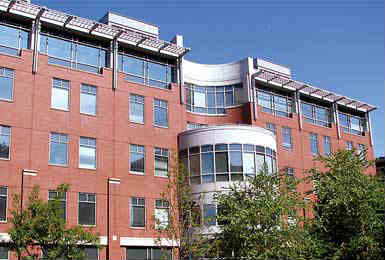Drug Companies Relocating R&D to Urban Labs
Pharmaceutical firms, large and small, have long favored locating their research operations on suburban campuses. Now this trend is changing.
November 2012

The driving force for this trend is opportunities to work side-by-side with academic researchers and teaching hospitals to develop new drugs according to Marc Cluzel, head of R&D for Sanofi-Aventis. For example, Roche, the Swiss pharmaceutical company, is opening its new Translational Clinical Research Center in Manhattan. It comes only three months after Roche announced it would close its sprawling research center in Nutley, New Jersey.
Roche signed an 11-year lease on space in an existing Manhattan building at 29th Street and First Avenue, the Alexandria Center for Life Science. The new facility will coordinate clinical trials of experimental drugs with New York City’s many teaching hospitals. Early next year, more than 200 people will transfer to the new site from Roche’s Nutley Research Center. The location decision marks a success in New York City’s efforts to become a life sciences and biotechnology hub.
Roche is not alone in its move to a metro area. Pfizer has established four Centers for Therapeutic Innovation medical hubs in Boston, New York, San Francisco, and San Diego. The company is working with 21 hospitals and universities on 23 different research collaborations. These collaborative partnerships “allow leading medical and clinical experts to work with Pfizer’s highly skilled scientists using advanced drug development capabilities to speed the translation of innovative science into medicines for patients,” according to Jose Carlos Gutierrez-Ramos, senior vice president and head of BioTherapeutics Research and Development for Pfizer. Overall, Pfizer is committing about $100 million to these collaborations over the next five years.
Drug company mergers are affecting some of these urban laboratories. For instance, Merck acquired Schering-Plough in 2010, which had a five-year-old cancer research laboratory in Boston. Merck announced it was closing this cancer lab and relocating an unspecified number of employees to a Merck lab in Boston’s Longwood Medical Area, which also does cancer drug research. This second lab is located on the Emmanuel College campus and illustrates some of the restrictions urban labs face. Its footprint — 425 feet long and 110 feet wide — brings three of the building’s sides to within inches of the property line of adjacent facilities. Yet, despite these challenges, pharma’s expansion to urban centers presses on.
Case in point: Drug company Novartis has become Boston’s largest industrial employer and has established joint drug development programs with Harvard and MIT. It is spending $600 million to double the size of its planned office and lab complex in Cambridge and expand partnerships with Boston universities and biotechnology start-ups, including the Novartis Institutes for Biomedical Research and Novartis Vaccines and Diagnostics. Its global research operations are already headquartered in Cambridge.
Boston is seeing more of this activity, with Sanofi-Aventis spending $65 million to expand its facility and add 300 jobs there; and AstraZeneca, GlaxoSmithKline, and Shire all having R&D facilities in the Boston metropolitan area.
Project Announcements
Johnson & Johnson Expands Wilson County, North Carolina, Production Operations
01/16/2026
TransMedics Group Plans Somerville, Massachusetts, Headquarters Operations
01/16/2026
Lithium Battery Company Plans Tampa, Florida, Battery Pack Production Operations
01/10/2026
Eurofins Lancaster Laboratories Expands Lancaster County, Pennsylvania, Research Operations
01/03/2026
Valerie Health Plans Chattanooga, Tennessee, Operations
01/02/2026
Samsung Biologics Plans Rockville, Maryland, Manufacturing Operations
12/31/2025
Most Read
-
The Workforce Bottleneck in America’s Manufacturing Revival
Q4 2025
-
Data Centers in 2025: When Power Became the Gatekeeper
Q4 2025
-
Speed Built In—The Real Differentiator for 2026 Site Selection Projects
Q1 2026
-
Preparing for the Next USMCA Shake-Up
Q4 2025
-
Tariff Shockwaves Hit the Industrial Sector
Q4 2025
-
Top States for Doing Business in 2024: A Continued Legacy of Excellence
Q3 2024
-
Investors Seek Shelter in Food-Focused Real Estate
Q3 2025



